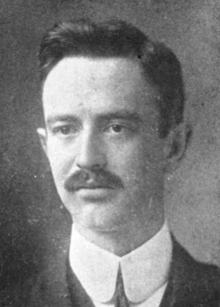Henry Gordon Wells
| Henry Gordon Wells | |
|---|---|
 |
|
| President of the Massachusetts Senate | |
|
In office January 1916 – January 1919 |
|
| Preceded by | Calvin Coolidge |
| Succeeded by | Edwin T. McKnight |
| Member of the Massachusetts Senate 4thEssex District |
|
|
In office January 1913 – January 1919 |
|
| Member of the Massachusetts House of Representatives 3rdEssex District |
|
|
In office 1910 – 1912 |
|
| Member of the Haverhill, Massachusetts Common Council |
|
| Personal details | |
| Born | October 12, 1879 Bridgeport, Connecticut |
| Political party | Republican |
| Spouse(s) | Edith Weeks Burke |
| Residence | Haverhill, Massachusetts |
| Alma mater |
Wesleyan University Harvard Law School |
| Profession | Lawyer |
Henry Gordon Wells (October 12, 1879 – 1954) was a lawyer and a Republican politician in Massachusetts and New Hampshire.
Wells was born on October 12, 1879 in Bridgeport, Connecticut to George Henry and Hannah Ada (Taylor) Wells. He attended Haverhill, Massachusetts public schools. He graduated from Tilton Seminary in New Hampshire in 1898, Wesleyan University in 1902, and Harvard Law School in 1905.
On April 18, 1906, he married Edith Weeks Burke of Middletown, CT, with whom he had five children: Chester T., Elizabeth W., Archer G., Eleanor E., and Henry G.
In 1905 he began his law practice in Haverhill, Massachusetts with the office of Poor & Fuller (later Poor & Abbott) until he opened his own practice (Wells & Hale) in 1907. In addition to practicing law, he was a trustee of the Haverhill YWCA, member of the City Hospital Aid Association, Vice President of the Haverhill, Massachusetts Boys Club, and director of the Haverhill, Massachusetts YMCA.
In 1918, Wells was appointed Essex County district attorney succeeding Louis D. Cox. Wells was the Essex County District Attorney during a locally famous case of Elizabeth M. Skeels. Elizabeth M. Skeels, alias, indicted in Essex County, Massachusetts in September 1918 for the murder of Florence Webster Gay in Andover, Massachusetts on December 10, 1917. Skeels was accused of administering arsenic while acting as Gay's nurse. She was arraigned on November 1, 1918 and pleaded not guilty. Daniel J. Daley, Esq., appeared as counsel for the defendant. In June, 1919, the defendant was tried by jury before Judge Webster Thayer. The result was a verdict of not guilty. The case was in charge of Hon. Henry Converse Atwill, Attorney-General, and District Attorney Henry G. Wells.
Vincenzo Issarella, indicted in Essex County, May 2, 1918, for the murder of Vito Rocco, in Haverhill, Massachusetts, February 10, 1918. He was arraigned May 28, 1918 and plead not guilty. William J. MacDonald, Esq., appeared as counsel for the defendant. On February 14, 1919, the defendant retracted his former plea, and plead guilty to manslaughter. This plea was accepted by the Commonwealth, and the defendant was sentenced to State Prison for a term of not more than fifteen nor less than thirteen years. The case was in charge of District Attorney Henry G. Wells.
...
Wikipedia
